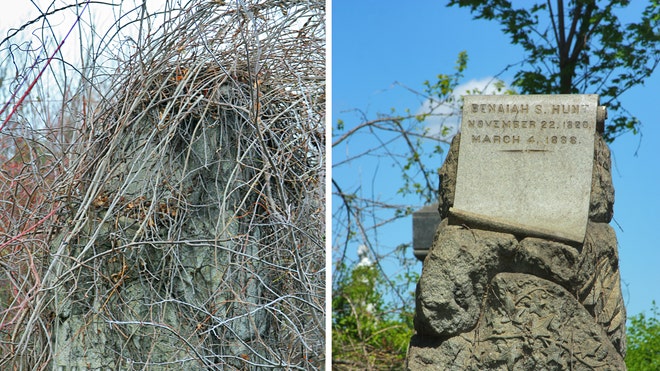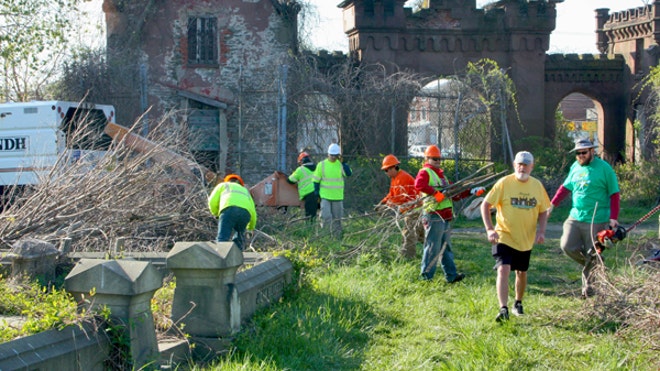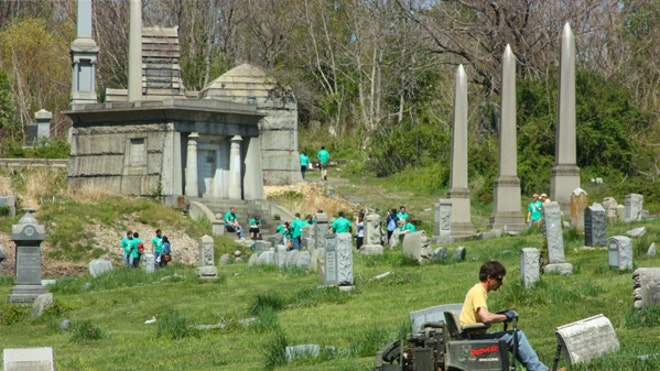Grave injustice: Group fights to reclaim cemetery's lost Medal of Honor recipients
FoxNews.com
Hidden in the jungle-like underbrush and Japanese knotweed smothering tombstones in an abandoned Philadelphia cemetery, Sam Ricks found his calling: to uncover and restore the graves of America's bravest -- forgotten heroes dating back to the Revolutionary War, 21 of whom are Medal of Honor recipients.
Ricks and his co-workers are painstakingly chopping through over-growth with machetes at Mount Moriah Cemetery, an estimated 380-acre historic graveyard straddling Philadelphia and Yeadon, Pa., in a quest to preserve history. Buried within the decrepit cemetery are 2,300 Navy and Marines dating from the Revolutionary War to the War of 1812 all the way to the Korean and Vietnam wars, according to Ricks. The graveyard is also the final resting place for 404 Union soldiers who fought in the Civil War, a few sailors, and two Confederate prisoners of war from the Battle of Sharpsburg.
And then there are the unmarked or dilapidated graves of heroes waiting to be identified.
"This is the heritage of our country," Ricks told FoxNews.com. "These stones -- they're not high-ranking officials or generals -- these are the enlisted men who fought the battles. And we're trying to tell their story.
"These guys didn't write history, they made it," he said.
The largest cemetery in Pennsylvania, Mount Moriah was officially abandoned in April 2011. At the time, the city was poised to cite the cemetery for various code violations, according to Ricks, a Philadelphia resident who has Confederate ancestors buried in Virginia.
"The employees just up and left," he said. "They put up a notice that said it was closed to burials."
Following a public uproar, the city intervened and brought in equipment to cut the grass. But it did not take responsibility for the graveyard that holds the largest number of Medal of Honor recipients in the state, Ricks said.
"Whole sections of the cemetery were jungle, and I don't use that word lightly," Ricks said, as he described acres of Sumac trees and Japanese knotweed, a bamboo-like plant considered an invasive species in the U.S. and other countries.
The 59-year-old Ricks, who retired from the trucking industry and now works as graves registrar for the Sons of Confederate Veterans' Pennsylvania Division, decided to take over. He and a group of volunteers, known as "Friends of Mount Moriah ," are tediously cleaning and restoring the vast graveyard in an effort to identify the dead and give proper tribute to a burial ground deeply steeped in history.
," are tediously cleaning and restoring the vast graveyard in an effort to identify the dead and give proper tribute to a burial ground deeply steeped in history.
Ricks said the group of volunteers was contacted in 2012 by the Medal of Honor Historical Society of the United States, which gave them a list of names of sailors they had traced to Mount Moriah cemetery but had no way of locating. Ricks and his team got to work, hunting for the men whose graves could not be found.
On a chilly, February afternoon last year, Ricks discovered a flat marker in the grass with the word "Unknown" engraved on its white marble headstone. After combing through documents and records, Ricks pieced together the individual's identity: Commodore Jesse Duncan Elliott, a hero of the War of 1812 who was awarded the Congressional Gold Medal in 1814. Elliott served as master-in-commander of the ship, the "Brig Niagara," and earned the medal from Congress for his heroic actions in the Battle of Lake Erie on Sept. 10, 1813.
"Our mission is to preserve history and then we have something to pass on to the next generation," Ricks said. "And when you're doing this for a descendent who spent years trying to track down their ancestor, you feel like you’ve done a great deed to finally find that person."
For information on how to donate to restoration efforts, visit FriendsofMountMoriahCemetery.org
http://www.foxnews.com/us/2013/09/29/grave-injustice-man-fights-to-reclaim-cemetery-lost-medal-honor-recipients/
 .
.
Ricks and his co-workers are painstakingly chopping through over-growth with machetes at Mount Moriah Cemetery, an estimated 380-acre historic graveyard straddling Philadelphia and Yeadon, Pa., in a quest to preserve history. Buried within the decrepit cemetery are 2,300 Navy and Marines dating from the Revolutionary War to the War of 1812 all the way to the Korean and Vietnam wars, according to Ricks. The graveyard is also the final resting place for 404 Union soldiers who fought in the Civil War, a few sailors, and two Confederate prisoners of war from the Battle of Sharpsburg.
And then there are the unmarked or dilapidated graves of heroes waiting to be identified.
"This is the heritage of our country," Ricks told FoxNews.com. "These stones -- they're not high-ranking officials or generals -- these are the enlisted men who fought the battles. And we're trying to tell their story.
"This is the heritage of our country."- Sam Ricks
"These guys didn't write history, they made it," he said.
The largest cemetery in Pennsylvania, Mount Moriah was officially abandoned in April 2011. At the time, the city was poised to cite the cemetery for various code violations, according to Ricks, a Philadelphia resident who has Confederate ancestors buried in Virginia.
"The employees just up and left," he said. "They put up a notice that said it was closed to burials."
Following a public uproar, the city intervened and brought in equipment to cut the grass. But it did not take responsibility for the graveyard that holds the largest number of Medal of Honor recipients in the state, Ricks said.
"Whole sections of the cemetery were jungle, and I don't use that word lightly," Ricks said, as he described acres of Sumac trees and Japanese knotweed, a bamboo-like plant considered an invasive species in the U.S. and other countries.
The 59-year-old Ricks, who retired from the trucking industry and now works as graves registrar for the Sons of Confederate Veterans' Pennsylvania Division, decided to take over. He and a group of volunteers, known as "Friends of Mount Moriah
 ," are tediously cleaning and restoring the vast graveyard in an effort to identify the dead and give proper tribute to a burial ground deeply steeped in history.
," are tediously cleaning and restoring the vast graveyard in an effort to identify the dead and give proper tribute to a burial ground deeply steeped in history.Ricks said the group of volunteers was contacted in 2012 by the Medal of Honor Historical Society of the United States, which gave them a list of names of sailors they had traced to Mount Moriah cemetery but had no way of locating. Ricks and his team got to work, hunting for the men whose graves could not be found.
On a chilly, February afternoon last year, Ricks discovered a flat marker in the grass with the word "Unknown" engraved on its white marble headstone. After combing through documents and records, Ricks pieced together the individual's identity: Commodore Jesse Duncan Elliott, a hero of the War of 1812 who was awarded the Congressional Gold Medal in 1814. Elliott served as master-in-commander of the ship, the "Brig Niagara," and earned the medal from Congress for his heroic actions in the Battle of Lake Erie on Sept. 10, 1813.
"Our mission is to preserve history and then we have something to pass on to the next generation," Ricks said. "And when you're doing this for a descendent who spent years trying to track down their ancestor, you feel like you’ve done a great deed to finally find that person."
For information on how to donate to restoration efforts, visit FriendsofMountMoriahCemetery.org
http://www.foxnews.com/us/2013/09/29/grave-injustice-man-fights-to-reclaim-cemetery-lost-medal-honor-recipients/
 .
. 


